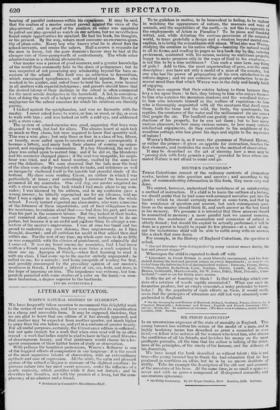SOUTER'S CATECHISMS.* • THESE Catechisms consist of the ordinary contents
of elementary works, broken up into question and answer ; and according to the plan of communicating information in this form, they seem very well done.
We cannot, however, understand the usefulness of so uninteresting a method of instruction. If a child is to learn the outlines of a history, we should prefer that he had some well-arranged narrative put into his hands ; which he should certainly master in some form, and that by the assistance of question and answer, but such extemporary ques- tions as the master should think fit, and such answer as the boy found in his memory. We presume it is intended that these answers should be committed to memory: a more painful task we cannot conceive, because the assistance of association and connexion of subject is utterly denied ; but should the exploit be actually performed, it will be done as a parrot is taught to repeat its few phrases—at a sort of sig- nal the industrious child will be able to rattle away with an answer, like a clock that runs down.
For example, in the History of England Catechism, the question is asked,
" Has not literature been distinguished by many eminent names during the last and present reigns ?"
Whereupon the child is expected to dash off with
" Literature in Great Britain is most liberally encouraged, and has flou- rished during the last and present reigns in every department ; as .may c,1- leeted from the following list of distinguished writers : Johnson, Henry, I hune, Gibbon, Smollet, Robertson, Coxe, Buchan, Harris, Lowth, Reid, Stuart, Brown, Goldsmith, Hawkesworth, Sir W. Jones, Paley, Blair, Priestley, Cum- berland,"—and so on for thirty more names.
Is this the art of teaching to think ? Is that knowledge which con- sists of a rotation of words rapidly enunciated ? What can such in- formation produce, but an empty coxcomb, a noisy pretender to know- ledge ? By the popularity of such efforts as these, it would really seem that the principles of education are still but very obscurely com- prehended in England.
* On the Geography and History of England, Ireland, Scotland, France, Greece, Szc. ; Classical Biography ; Astronomy and Botany ; English and French Grammar ; Che- misiry ; magic, &c. In numbers or volumes. (We have seen 4 volumes, neatly bound.) London, 1829. Seater.


















 Previous page
Previous page